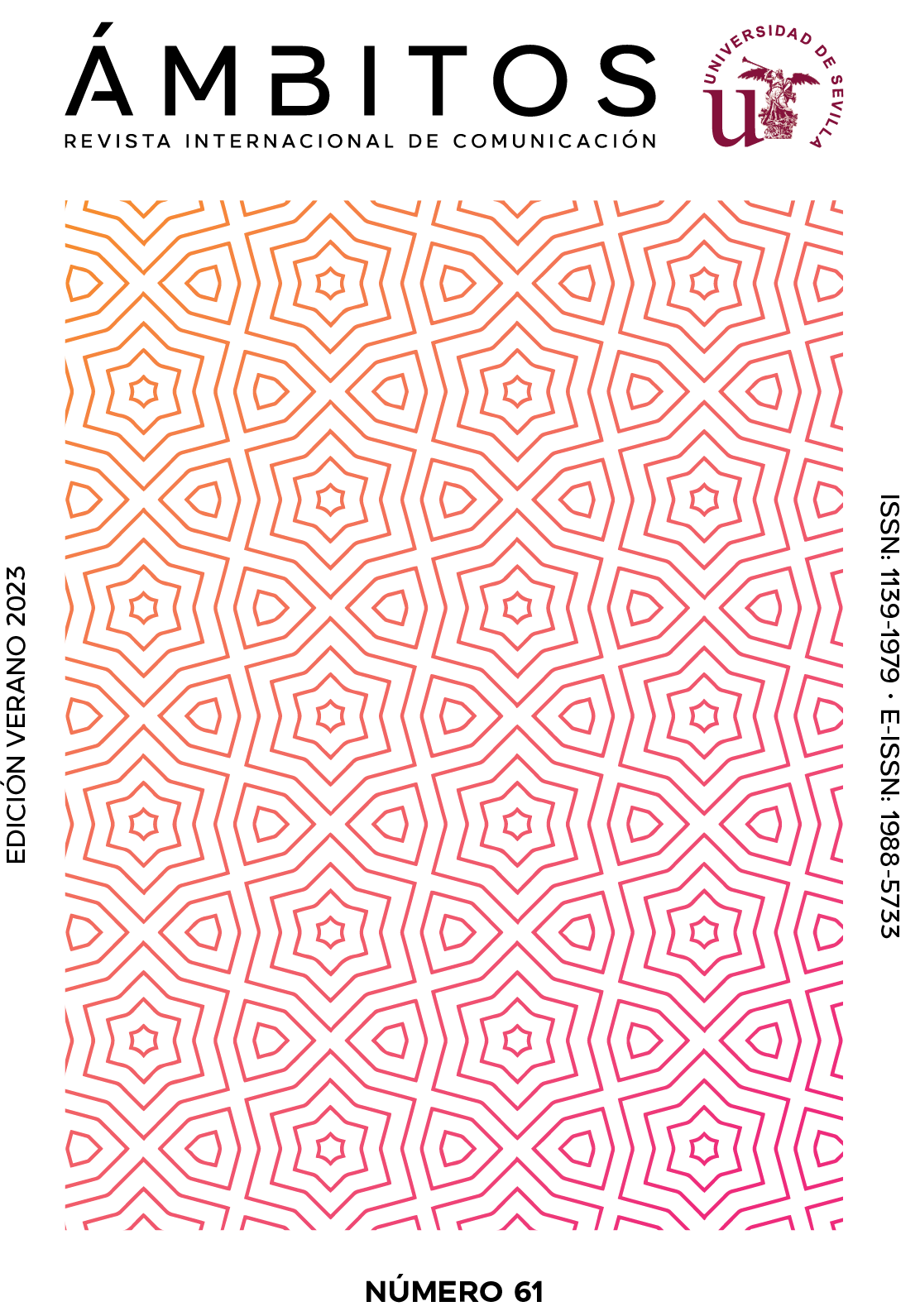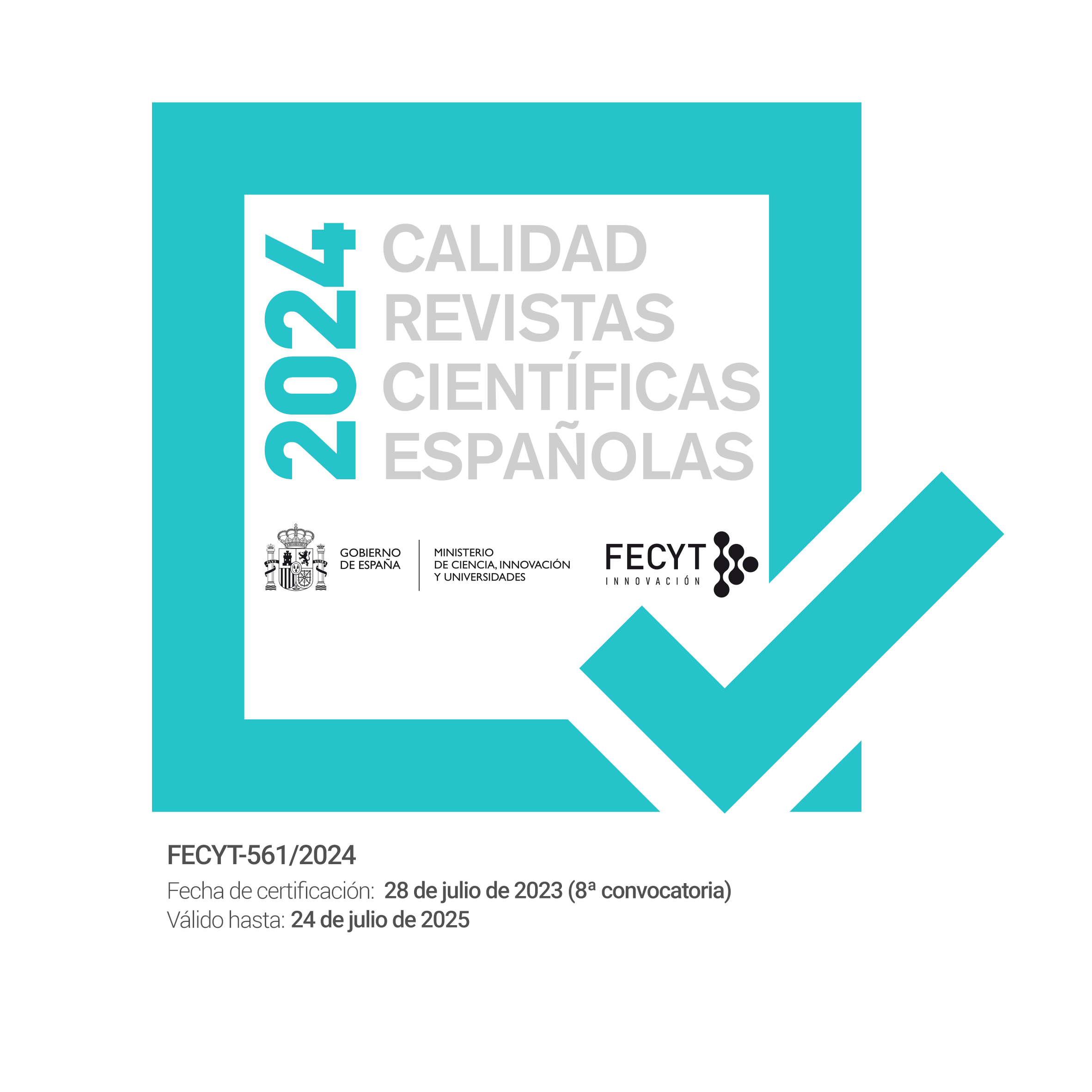Concern for climate change, attribution of responsibilities and effect on the voting decision of university students: the case of the UPV/EHU
DOI:
https://doi.org/10.12795/Ambitos.2023.i61.01Keywords:
climate change, communication, ecoanxiety, university students, UPV/EHUAbstract
This paper analyses the degree of concern for climate change among university students and their reaction to it, taking the student body of the University of the Basque Country (UPV/EHU) as a case study. To this end, a structured survey was carried out with a representative sample of this university (n=465) comprising a total of 14 questions using several scales. The results indicate that university students are concerned about the climate crisis, although paradoxically, 45.4 % rarely or never seek information on the subject in the media, and 24 % experience eco‑anxiety. They unequivocally identify companies, institutions, and governments as the culprits of the problem, while attributing much less responsibility to the general public. Moreover, one of the paradoxes detected is that their concern and opinion on climate change and its culprits does not condition their political choices when voting. Finally, the study is presented as an open line of research to analyze the concern and reaction to climate change in universities in other autonomous communities, thus achieving a nationwide analysis. The study also recommends that university institutions incorporate more cross‑cutting initiatives on climate communication and education, as well as psychosocial support plans for university students to prevent and reduce climate eco‑anxiety.
Downloads
References
Albrecht, G. (2011). Chronic Environmental Change: Emerging ‘Psychoterratic’ Syndromes. In I. Weissbecker (Ed.), Climate Change and Human Well‑Being. International and Cultural Psychology (pp. 43–56). Springer., https://doi.org/10.1007/978‑1‑4419‑9742‑5_3
Arto‑Blanco, M., Meira‑Cartea, P. Á., & Gutiérrez‑Pérez, J. (2017). Climate literacy among university students in Mexico and Spain: Influence of scientific and popular culture in the representation of the causes of climate change. International Journal of Global Warming, 12(3‑4), 448–467. https://doi.org/10.1504/IJGW.2017.084791
Arto‑Blanco, M., Santiago, M. P., & Cartea, P. Á. M. (2021). La sociedad española ante la emergencia climática: cognición, emoción y acción. In R. Mancinas Chávez, R. Fernández Reyes, & D. Rodrigo Cano (Eds.), La comunicación del cambio climático, una herramienta ante el gran desafío (pp. 273–296). Dykinson., http://bitly.ws/BU7f
Atiqul Haq, S. M. (2011). Nexus between perception, environment and fertility: A study on indigenous people in Bangladesh. Sustainable Development, 21(6), 372–384. https://doi.org/10.1002/sd.515
Barrera‑Hernández, L. F., Murillo‑Parra, L. D., Ocaña‑Zúñiga, J., Cabrera‑Méndez, M., Echeverría‑Castro, S. B., & Sotelo‑Castillo, M. A. (2020). Causas, consecuencias y qué hacer frente al cambio climático: Análisis de grupos focales con estudiantes y profesores universitarios. Revista Mexicana de Investigación Educativa, 25(87), 1103–1122. http://bit.ly/405cJ7u
Budziszewska, M., & Głód, Z. (2021). “These Are the Very Small Things That Lead Us to That Goal”: Youth Climate Strike Organizers Talk about Activism Empowering and Taxing Experiences. Sustainability, 13(19), 11119. https://doi.org/10.3390/su131911119
Di Giusto, B., Lavallee, J. P., & Yu, T. Y. (2018). Towards an East Asian model of climate change awareness: A questionnaire study among university students in Taiwan. PLoS One, 13(10), e0206298. https://doi.org/10.1371/journal.pone.0206298
Doherty, T. J., & Clayton, S. (2011). The psychological impacts of global climate change. The American Psychologist, 66(4), 265–276. https://doi.org/10.1037/a0023141
Flora, J. A., Saphir, M., Lappé, M., Roser‑Renouf, C., Maibach, E. W., & Leiserowitz, A. A. (2014). Evaluation of a national high school entertainment education program: The Alliance for Climate Education. Climatic Change, 127(3‑4), 419–434. https://doi.org/10.1007/s10584‑014‑1274‑1
Gabinete de Prospección Sociológica. (2023). Euskal soziometroa / Sociómetro Vasco 79. Gobierno Vasco. http://bit.ly/40pptFH
Gabinete de Prospección Sociológica. (2021). Cambio climático y transición energética. Gobierno Vasco. http://bit.ly/3TzzuOz
Gumucio, C. P., & Muñoz Rau, J. (2012). Elites universitarias y cambio climático. Ambiente & Sociedade, 15(2), 195–218. https://doi.org/10.1590/S1414‑753X2012000200011
Haq, S. M. A., & Ahmed, K. J. (2020). Perceptions about climate change among university students in Bangladesh. Natural Hazards, 103(3) 3683–3713. https://doi.org/10.1007/s11069‑020‑04151‑0
Kulcar, V., Siller, H., & Juen, B. (2022). Discovering emotional patterns for climate change and for the COVID‑19 pandemic in university students. The Journal of Climate Change and Health, 6, 100125. https://doi.org/10.1016/j.joclim.2022.100125
Leal Filho, W., Mifsud, M., Molthan‑Hill, P., Nagy, J. G., Veiga Ávila, L., & Salvia, A. L. (2019). Climate Change Scepticism at Universities: A Global Study. Sustainability, 11(10), 2981. https://doi.org/10.3390/su11102981
Li, Y. Y., & Liu, S. C. (2022). Examining Taiwanese students’ views on climate change and the teaching of climate change in the context of higher education. Research in Science & Technological Education, 40(4), 515–528. https://doi.org/10.1080/02635143.2020.1830268
Likert, R. (1932). A technique for the measurement of attitudes. Archives de Psychologie, 22(140), 5–55.
MacKay, M., Parlee, B., & Karsgaard, C. (2020). Youth engagement in climate change action: Case study on indigenous youth at COP24. Sustainability, 12(16), 6299. https://doi.org/10.3390/su12166299
Maran, D. A., & Begotti, T. (2021). Media exposure to climate change, anxiety, and efficacy beliefs in a sample of Italian university students. International Journal of Environmental Research and Public Health, 18(17), 9358. https://doi.org/10.3390/ijerph18179358
Méndez‑Cadena, M. E., Fernández Crispín, A., Cruz Vargas, A., & Bueno Ruiz, P. (2020). De la representación social del cambio climático a la acción: El caso de estudiantes universitarios. Revista Mexicana de Investigación Educativa, 25(87), 1043–1068. http://bit.ly/3FF0VAt
Miranda Velázquez, E. M., Quintero, B. B., Romero, J. M. R., Gallegos, E. M. G., Morocho, B. N. V., & Luna, J. A. S. (2021). Percepción y actitud de los estudiantes universitarios respecto al cambio climático. Cumbres, 7(1), 35–44. https://doi.org/10.48190/cumbres.v7n1a3
Oltra, C., Solà, R., Sala, R., Prades, A., & Gamero, N. (2009). Cambio climático: Percepciones y discursos públicos. Prisma Social: Revista de Investigación Social, 2(10), 1–23. http://bit.ly/3lCU1oB
Pörtner, H. O., Roberts, D. C., Poloczanska, E. S., Mintenbeck, K., Tignor, M., Alegría, A., . . . Okem, A. (2022). IPCC, 2022: Summary for policymakers. http://bit.ly/3LGnGrQ
Romans i Torrent, A. R. (2022). La trampa de la incidencia: El caso del activismo juvenil ecologista en Catalunya. Ámbitos. Revista Internacional de Comunicación, (55), 58–72. https://doi.org/10.12795/Ambitos.2022.i55.04
Segado‑Boj, F., Díaz‑Campo, J., & Navarro‑Sierra, N. (2020). Emociones y difusión de noticias sobre el cambio climático en redes sociales. Influencia de hábitos, actitudes previas y usos y gratificaciones en universitarios. Revista Latina de Comunicación Social, (75), 245–269. https://doi.org/10.4185/RLCS‑2020‑1425
Shi, J., Visschers, V. H., Siegrist, M., & Arvai, J. (2016). Knowledge as a driver of public perceptions about climate change reassessed. Nature Climate Change, 6(8), 759–762. https://doi.org/10.1038/nclimate2997
Stevenson, K., & Peterson, N. (2015). Motivating action through fostering climate change hope and concern and avoiding despair among adolescents. Sustainability, 8(1), 6. https://doi.org/10.3390/su8010006
Stewart, A. E. (2021). Psychometric properties of the climate change worry scale. International Journal of Environmental Research and Public Health, 18(2), 494. https://doi.org/10.3390/ijerph18020494
von Kardorff, E. (2019). Castells (1996): The Rise of the Network Society. In B. Holzer & C. Stegbauer (Eds.), Schlüsselwerke der Netzwerkforschung (pp. 105–109). Springer. https://doi.org/10.1007/978‑3‑658‑21742‑6_25
Wachholz, S., Artz, N., & Chene, D. (2014). Warming to the idea: University students’ knowledge and attitudes about climate change. International Journal of Sustainability in Higher Education, 15(2), 128–141. https://doi.org/10.1108/IJSHE‑03‑2012‑0025
Wu, J., Snell, G., & Samji, H. (2020). Climate anxiety in young people: A call to action. The Lancet. Planetary Health, 4(10), e435–e436. https://doi.org/10.1016/S2542‑5196(20)30223‑0
Downloads
Published
How to Cite
Issue
Section
License
Copyright (c) 2023 Alex Fernandez Muerza, Sergio Monge Benito

This work is licensed under a Creative Commons Attribution-NonCommercial-ShareAlike 4.0 International License.
Ámbitos. Revista Internacional de Comunicación is an open access journal, which means that all content is freely available at no charge to the user or their institution. Users may read, download, copy, distribute, distribute, print, search or link to the full text of articles, or use them for any other lawful purpose, without seeking prior permission from the publisher or author. This definition of open access is in accordance with the Budapest Open Access Initiative (BOAI).

Unless otherwise noted, all content in the electronic edition is distributed under a "Creative Commons Attribution-NonCommercial-ShareAlike 4.0 International License". You can consult the informative version and legal text of the licence here. This should be expressly stated in this way where necessary.
In case of acceptance of the manuscript, the authors cede the rights of the work for its publication to Ámbitos. Revista Internacional de Comunicación under the Attribution-NonCommercial-ShareAlike 4.0 International license contract (CC BY-NC-SA 4.0). The authors retain copyright and third parties are authorised to copy, distribute and make use of the work, provided they comply with the terms and conditions set out in the licence
- Cite the authorship and the original source of publication (journal, publisher and URL of the work).
- Do not use them for commercial purposes.
- If you remix, transform or create from the material, you must release your contributions under the same license as the original.
More information can be found at https://creativecommons.org/licenses/by-nc-sa/4.0/deed.es


















